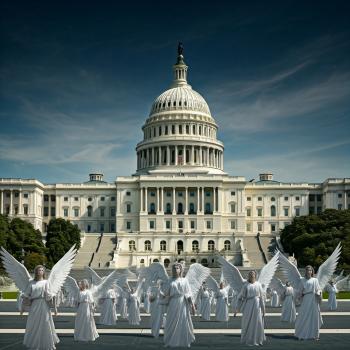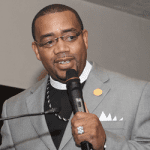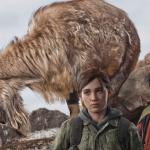Tribulation Force, pp. 298-306
The conclusion of this chapter is a flurry of rhythmic editing — a frantic cutting back and forth from Buck's storyline to Rayford's and back again. As in film, this creates a choppy but propulsive effect, giving the sense of some impending collision or climax. Back and forth, back and forth, Buck, Rayford, Buck, Rayford — building towards …
Well, nothing much, it turns out. Rayford rides from the U.N. building out to JFK Airport. Buck rides from JFK to the U.N. building, then back out to JFK. And that's pretty much it. The rapid back-and-forth editing turns out only to be a way of hiding the utter lack of plot and character development in these pages.
We begin by saying goodbye to Rabbi Marc Feinberg, the temple enthusiast who is Jewish and therefore, for these authors, cheap:
As the cab pulled up to the curb at Kennedy International, Rabbi Marc Feinberg said, "I'm sure you won't mind including my trip in your total, as you did interview me."
"Certainly," Buck said. "Global Weekly is more than happy to provide you a trip to the airport, provided we don't have to fly you to Israel."
"Now that you mention it –," the rabbi said with a twinkle, but he did not finish the thought. He merely waved, retrieved his valise from the cabby, and hurried into the terminal.
The miserly Jew stereotype may strike some readers as anti-Semitic, particularly when added to all the John Birch Society/tea party paranoia earlier about a global conspiracy of international financiers. And it looks even worse when we also consider that a central premise of Tim LaHaye's Birchified theology is the premillennial dispensationalist tenet that God's plan of salvation was delayed by "The Jews" — always collectively — refusing to accept Jesus as Messiah and The Jews therefore, collectively, being given a second chance in the End Times to accept Jesus and convert or else be eternally damned.
But LaHaye would argue that he cannot be accused of anti-Semitism because of his unwavering support for right-wing politicians in Israel. Plus, of course, some of his best friends are Christ-killing Shylocks.
Another full page of back-and-forthing establishes that Rayford and Nicolae are headed for where Buck is while Buck will be heading for where they are, until finally Rayford gets settled into the Antichrist's limousine.
Rayford found it strange that though he had been offered no refreshment at the office, Carpathia now insisted on showing him everything available in the limo, from whiskey to wine, to beer and soft drinks. Rayford accepted a Coke.
"Are you not a drinker?"
"Not anymore." …
… "I am not a drinker either," Carpathia said, sipping seltzer water.
Nicolae's abstention is spotlighted here so emphatically that I gather it's meant to be a significant clue about his true identity — the sort of thing that will make studious Antichrist-watchers say, "Aha! Check that one off the list."
But I'm fairly well versed in the Antichrist check lists of LaHaye and Hal Lindsey and I don't remember encountering this before as a criteria or attribute of the Beast. Can anyone help me out here? Anyone know the deeper significance of Nicolae's teetotalism?
In between the ellipses in the quotes above is an odd little snippet of dialogue that's worth a closer look:
"Are you not a drinker?"
"Not anymore."
"Used to be?"
"Never a hard drinker, but occasionally unwise. I haven't touched a drop since I lost my family."
"I was sorry to hear of that."
"Thank you …"
Yes, that last line is Rayford Steele thanking the Antichrist for his kind words and expression of sympathy. And in the circumstance, that's entirely appropriate, because Nicolae's words here are kind. He's one of the few people to express such concern for Rayford and it's another reminder that this diabolical beast seems, in many ways, more fundamentally decent than the heroes we're meant to admire.
"Thank you, but I have come to terms with it. I miss them terribly –"
"Of course."
"But I have peace about it."
"Your religion believes that Jesus Christ has taken his own to heaven, is that it?"
"That's it."
"I will not pretend that I share that belief, but I respect any comfort the thought may bring you."
Rayford wanted to argue, but he wondered at the advisability of doing what Bruce Barnes would call "witnessing" to the Antichrist.
"I am not a drinker either," Carpathia said, sipping seltzer water.
I can't figure out what to make of that statement from Nicolae: "I will not pretend that I share that belief." What it would seem to mean, I suppose, is something like "I will pretend that I do not share that belief," even though of course he does. The Antichrist, in this story, knows perfectly well that the Event was, in fact, the rapture, and that "Jesus Christ has taken his own to heaven."
So we might assume that Nicolae is simply lying — claiming not to believe what he knows to be true. But while it might make sense in this particular instance for him to lie to Rayford about this, it doesn't make any sense in the bigger picture for him to continue to lie to himself about it.
If, as the authors suggest throughout these books, Nicolae is fully aware of the biblical prophecies regarding the Antichrist, then why go through with it? He knows all about the check list, including how it ends, so why should he want to follow such a script? I wouldn't if I were him. Would you? It makes him seem like the guy in the old joke who tries to win his money back by going double-or-nothing on the instant replay.
Nicolae, as a character, would make more sense if he had some largely parallel, but ultimately divergent, alternate prophecy he was working from. It might be an explicitly infernal alternative — the Satanic Apocalypse or some such — but it could also be something more ambiguous. Imagine there is a 2,000-year-old monastery in the mountains near Cluj, where a hermetic sect of scholars has studied and waited, keeping their secrets and biding their time. They regard themselves as Christians, but they split off from the rest of the church around the Council of Laodicea, settling on their own, very different set of canonical scriptures including several apocalyptic writings largely unknown to the world outside the walls of their monastery: "And in the last days the conqueror shall ride forth to prepare the way for the Lamb, and with him and against him shall stand the scribe and the winged man. …"
That sort of thing. That could be interesting and it might make Nicolae's actions make more sense. Because whether or not Nicolae will "pretend to share" Rayford's belief in the rapture, he's got to believe in something if readers are going to find him believable.
Actually, though, what I suspect the authors intended with this odd conversation was to indicate a distinction between mere knowing and believing. That distinction provides the basis for a multitude of evangelical sermons, most of which rely on a garbled inversion of a passage from the book of James.
The idea is that it's not good enough simply to know intellectually that "Jesus Christ will take his own to heaven" — you have to believe it. The word "believe" is necessarily in italics there because that's what belief seems to be in these sermons — italicized knowledge.
Think of something you know. Now, close your eyes, clench them into a tight squint and frown a bit as though you've just heard terrible news. Concentrate on a spot a few inches below your sternum, trying to conjure a warm, fluttery sensation there. Now state out loud that thing you know in as earnestly sincere tone as you can muster.
There you go. Now you're not just knowing like some academic egghead, you're believing. See, the Antichrist may know about Jesus and the rapture, but he doesn't believe in them the way Rayford does. It's just like the Bible says, "You know that God is one; you do well. Even the demons know that — and shudder. … Knowledge without belief is barren."
The problem with those sermons is that's not quite what the Bible actually says. What it really says is, "You believe that God is one; you do well. Even the demons believe — and shudder. Do you want to be shown, you senseless person, that faith without works is barren?"
In the better versions, the garbling is mainly semantic — with what the preacher calls "believing" meaning more or less the same sort of active, tangible thing James meant by "works." Here, for example, is the beloved classic Tightrope Walker Sermon Illustration — presented in this case as making a distinction between "faith" and "belief." Such tortured linguistic distinctions become necessary when you're trying to avoid James' clearer, but inconveniently "strawy" language in the verses that follow (e.g., "a person is justified by works and not by faith alone").
Back at the U.N. building, Buck asks Steve for Nicolae's help setting up an interview with the Two Witnesses in Jerusalem. Landing that interview would be a great "get," but why stop there? If Buck is willing to network with the Antichrist to set up interviews then he should really go for broke — a Global Weekly exclusive interview with War, Famine and Death would be an even bigger coup.
Alas, Steve says, Nicolae probably won't help Buck with his assignment. "Nicolae hates those two," he says, surprising no one, but:
"I'll see what I can do. He's with a pilot candidate today."
"You don't say."
Jerry Jenkins never gets tired of this. He loves to have Nicolae tell Rayford about "a young journalist" while Rayford sits there knowingly, or to have Steve talk to Buck about "a pilot candidate" while Buck smirks that he knows more than Steve might guess. Jenkins is sure that this makes his heroes seem clever.
Nicolae and Rayford arrive at the airport and pull up beside the hangar where Air Force One is being repainted.
Carpathia said to the driver, "Tell Frederick we would like the usual drama."
When the hangar doors opened, the plane was illuminated with brilliant spotlights. …
That "the usual drama" is the closest Nicolae has yet come to exhibiting the droll charm Jenkins has been telling us he possesses.
We've been told twice now about Nicolae's plan to sneakily commandeer Air Force One by having it repainted, and here Jenkins takes another page to describe for us the actual process of this repainting. This is followed by half a page of airplane porn:
Rayford had toured countless new aircraft and was usually impressed, but he had never seen anything like this.
Every detail was richly appointed, expensive, functional and beautiful. In the rear were full bathrooms with showers. Then came the press area, large enough for parties. Every seat had its own phone, modem jack, VCR and TV. A restaurant was midship, fully stocked and with room to move and breathe.
Closer to the front came the presidential living quarters and conference room. One room contained high-tech security and surveillance equipment, backup communications, and technology allowing the plane to communicate with anyone anywhere in the world.
I'm not sure Jenkins is good enough at this sort of writing to land a gig with MTV Cribs, but he's giving it his best shot. Get him started on the luxury amenities of a pimped-out airliner and he writes with a fervor and intensity not found in the rest of the book.
All those amenities are apparently the reason Nicolae has decided to swipe this plane from President Fitzhugh. But for all the time the authors spend rehashing Nicolae's supposedly clever plan to pretend the temporary loan of the plane is a permanent gift, they don't seem to notice that Air Force One is an Air Force plane — and Nicolae already commandeered the entire Air Force several chapters ago. He's also easily capable of nationalizing (global-izing?) Boeing or Gulfstream and ordering them to build him an even bigger, blingier airplane than this one. (He'd probably have to nationalize Boeing anyway, since his disarmament plan would have bankrupted them.)
The only reason I can think that Nicolae would insist on redundantly re-stealing this particular airplane would be the prestige that comes from the aura of Air Force One. But then that aura pretty much goes away when you have the thing repainted.
Back at the U.N., Hattie drops by Steve's office to talk about Rayford so Jenkins will have yet another chance to delight in Buck's pretending not to know his friend.
"You know who was in today?" she said.
He knew, but he didn't let on. "Who?"
Buck realized he would have to stay on his toes with her and with Steve, and especially with Carpathia. They must not know how close he was to Rayford, and if he could keep from them any knowledge of his developing relationship with Chloe, so much the better.
"Rayford Steele. He was the pilot the day I met you on the plane."
Buck takes his cue from this oddly unnecessary explanation and plays along as though this were his only connection to Rayford.
What neither he nor Hattie mentions, and what the authors themselves seem to have forgotten, is that he and Hattie spent an evening together with Rayford and his daughter Chloe, dining together at a fancy restaurant where Hattie took great delight in matchmaking Buck and Chloe. At the time she seemed very proud of how well the two hit it off — so proud that it's surprising that she isn't greeting Buck every time she sees him with lots of prying questions about how things are going with his new girlfriend. But instead she seems to have forgotten that dinner ever took place.
The simplest explanation is that this is yet another screaming continuity error in these books — the sort of thing that tends to happen when a "novel" is hastily typed and never re-read, let alone edited, before being slapped onto the page and shipped to bookstores. But what if Hattie and Nicolae are actually doing this on purpose?
"Well, Hattie, as planned I spoke about Buck to Rayford and he acted as though he had no idea who this 'young journalist' was. Very suspicious."
"And I did like you said, Nicky, and talked about Rayford to Buck. He acted like he barely knew the guy."
"It is as I suspected then. They are obviously hiding something. …"
Steve agrees to drive Buck back to JFK to tour the new plane and Rayford flies back to Chicago so that he can then turn around and fly back to New York before flying to Israel.
"Have you heard from Buck?" Rayford asks Chloe when he arrives home, and in the final lines of the chapter, Jenkins finds a chance to appall readers one more time before moving on.
"He's supposed to call at midnight his time."
"Do I need to stay up to make sure you're awake?"
"Hardly. He doesn't even know we ate our cookies at the same time. I wouldn't miss telling him that for anything."
















